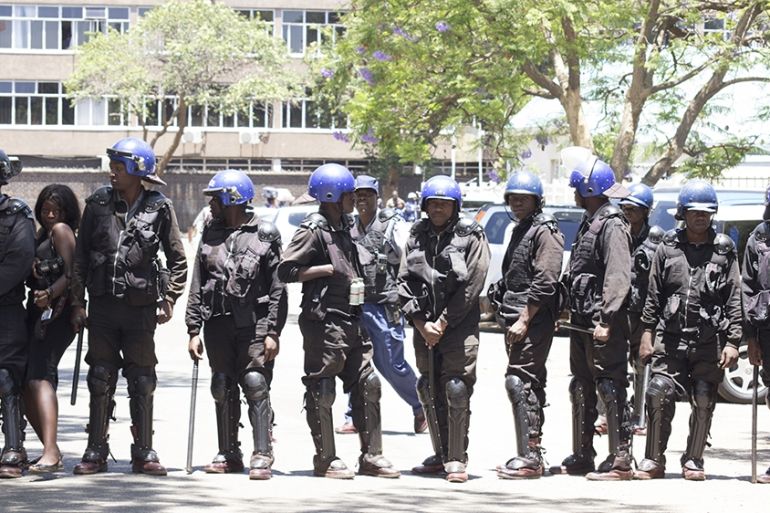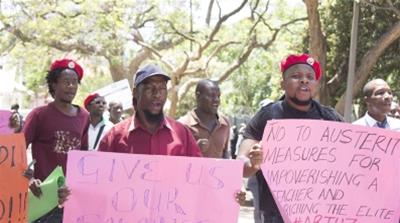Zimbabwe’s government workers want wages pegged to US dollars
Unions say salaries tied to United States currency is the way to cushion public-sector employees against hyperinflation.

Harare, Zimbabwe – Baton-wielding Zimbabwean police officers blocked a handful of government workers from marching to the Ministry of Finance and Economic Development’s office today to present a petition against wages that have been decimated by hyperinflation in the Southern African nation. Protesters described their pay as peanuts, and demanded a living wage.
Zimbabwe‘s President Emmerson Mnangagwa has banned several opposition protests and faces charges that he has dealt with protesters in a heavy-handed way since taking over in a military coup in November 2017.
Keep reading
list of 4 itemsUS imposes new sanctions on Iran after attack on Israel
A flash flood and a quiet sale highlight India’s Sikkim’s hydro problems
Why is Germany maintaining economic ties with China?
For months now, police have been manning Harare’s streets trying to deter mass protests as the economic situation worsens.
Workers convened in the capital on Wednesday after a Tuesday meeting between government officials and the union representing government workers, the Civil Service Apex Council, only widened differences. The workers want the government to peg their salaries to the United States dollar so that even if the value of the local currency declines, their purchasing power remains consistent.
Despite getting prior permission from the police to march along designated routes in the city on their way to the finance ministry, the protesters were restricted to an area almost one kilometre away from Minister of Finance Mthuli Ncube’s office in Harare. Union leaders at the scene asked the police to allow them to deliver the petition to Ncube’s office, but their requests were ignored. Instead, dozens of anti-riot police erected a human barricade and barred protesters from proceeding to the ministry’s offices.
Cecilia Alexander, president of the Civil Service Apex Council, said a heavy police presence at the protest’s venue had intimidated would-be protesters.
“We were not expecting the low turnout, but that can be attributed to the presence of these police tankers, police wielding batons, and their sheer numbers,” she said. “The police who came are the ones who normally just beat up people. We were expecting ordinary cops.”
Alexander said “[The] government has indirectly denied us the right to march. They have given us new conditions. We were supposed to march to [the government’s] Kaguvi building and then [the] government complex to present our petition, but they are only allowing [us] to go round the block and come here.”
When Alexander attempted to pass, she says, police moved swiftly to deny her entry.
No longer able to survive on wages
Standards of living in Zimbabwe have plunged during its recent economic crisis, and the majority of workers now struggle to make ends meet. David Dzatsunga, the secretary-general of the Civil Service Apex Council, told Al Jazeera that government workers are no longer able to survive at their current rates of pay.
“This protest is about our salaries,” he said. “We have a dire economic situation where are our salaries can no longer buy anything meaningful. We raised our concerns with [the] government, but they [have] not acted on these concerns.”
Dzatsunga said workers were “incapacitated” and can no longer afford to come to work.
“Only monkeys can survive on peanuts,” a placard at the protest read.

Another union official, Thomas Muzondo, said workers can no longer afford the bus fare to come to their jobs – and are often sleeping at work. He said the lowest-paid government employee in 2018 earned $450 when everyone was being paid directly in US dollars. “Now, they earn only [the equivalent of] $30,” Muzondo said.
“What is happening in the economy is that everyone else is benchmarking prices in US dollars, and we are still getting bond notes [the local currency].”
Zimbabwe, which adopted the use of US dollars after hyperinflation, decimated the value of the Zimbabwe dollar in 2009, and outlawed the use of foreign currencies in June.
In December 2016, the country’s central bank introduced bond notes, a surrogate currency it claimed had one-to-one equivalence with the US dollar. Years later, in February 2019, the government declared the bond notes no longer had the same value as the US dollar.
Since that declaration, the surrogate currency’s value has plunged. It now trades at a rate of one to 20 with the US dollar on the black market. (The official interbank market tends to be generally controlled by the central bank, and mostly does not reflect the currency’s real value, forcing many Zimbabweans to use black market dealers when trading foreign currencies.)
Salaries, in contrast, are paid in the local currency and have largely remained unchanged. This means that wages have lost as much as 95 percent of their purchasing power. So if someone was earning $1,000 US dollars/bonds before February and still earns the same amount today, he is really only bringing home the equivalent of $50 a month in wages.
Unions say a US dollar-linked salary is the only way to cushion public-sector workers against inflation that the International Monetary Fund says reached 300 percent in August.
The government banned the publication of annual inflation numbers until next February to allow the collection of like-for-like data.
The Civil Service Apex Council represents more than 230,000 workers, excluding those in the health and security sectors. The union wants the lowest-paid government employees to earn the equivalent a monthly 9,500 Zimbabwe dollars ($475, at commonly used black-market rates) compared with the 1,023 Zimbabwe dollars ($51.15) they earn currently.
Finance Minister Mthuli Ncube says the government cannot meet the workers’ demands.